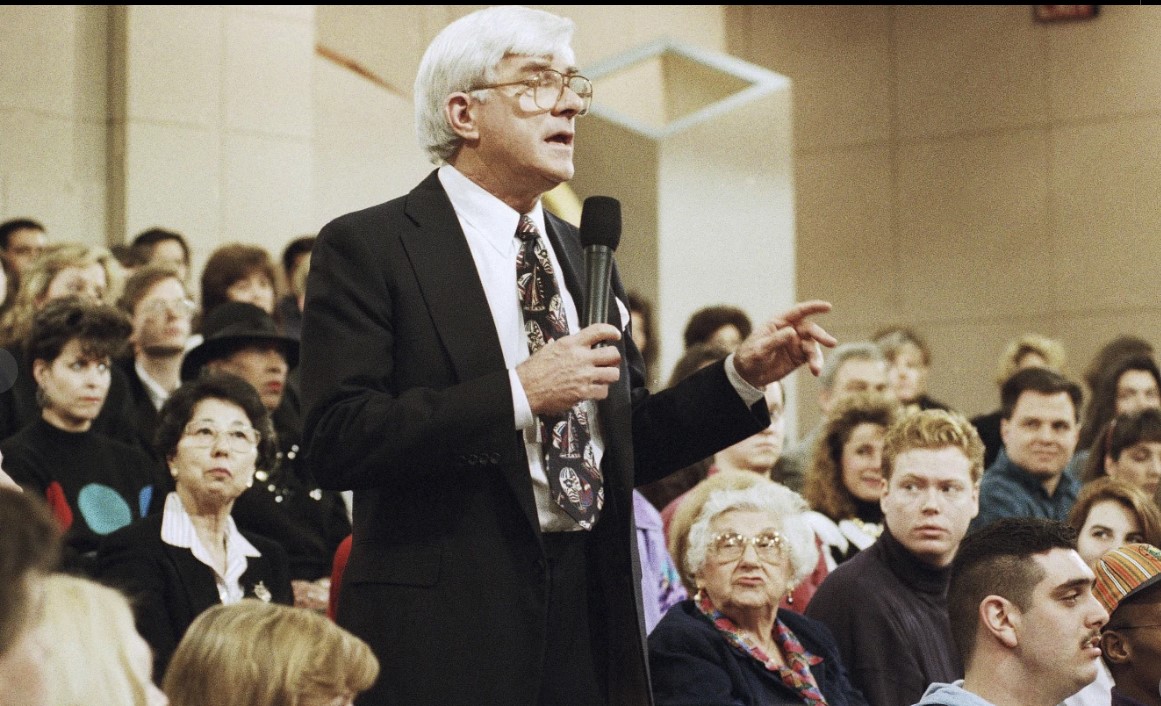
Amid all the political hoopla, I was saddened to hear of Phil Donahue’s death. Phil Donahue, influential TV talk show host, dead at 88 – ABC News (go.com) Although he was among the most popular TV personalities during the late ‘70s and ’80s, I wonder if folks still remember him or appreciate his lasting contributions to journalism and daytime talk shows.
As a journalist, Phil tirelessly advocated for mental health, bringing facts reason to allay fears and stigma. Likewisse, he not only talked with his guests, he also engaged with his audience. His comfortable and relaxed style helped his audience connect and open up in a meaning dialog. Indeed, he helped me, as a young therapist learn how to learn how to talk to and connect with my clients.

Looking back, Phil Donahue and his show were a huge part of my postgraduate education. His programs provided accurate information on a wide range of issues. He made such an impact on me that, even as a poor graduate student, I scraped $800 together to buy a VCR so I wouldn’t miss his shows.
Sadly, given the polarization, lies and incivility that permeate our culture, shows like his no longer exist. Nonetheless, the importance of his pioneering work remains.
I fear that the coarsening of some contemporary news sources and media has so desensitized people to the point that many have come to accept crude and lie-filled reporting as the norm. Therefore, despite the distraction of the political convention, let’s review the accomplishments and legacy of this remarkable man,
Phil Donahue brought many innovations to his program, including spending an entire hour on a single topic and inviting his live audience to ask questions of his guests. Most of all, he conveyed his genuine curiosity and desire to learn and understand not only the details of the topic but also what his audience members cared about and wanted to know.
His famous “Help me out, here.” comment, which he would say to both guests and the audience, expressed his drive to pursue an issue until it was clear.
Apart from his groundbreaking format, there are many other reasons to remember and appreciate Phil Donahue. For me, however, three qualities define his legacy:
1) He took women seriously;
2) His show taught America how to talk intelligently about embarrassing things like mental health and sex; and
3) He gave national attention to important issues before anyone else.
HE TOOK WOMEN SERIOUSLY.
To fully appreciate how revolutionary the Phil Donahue Show was, consider how much life has changed over the past 50 years, especially since the cultural upheaval of the ‘70s.
In addition to civil rights and the sexual revolution, the struggle for women’s rights was a source of conflict and strife. By contrast, television, especially daytime programming, consisted mainly of game shows, soap operas, and an occasional cooking show.
Phil was a pioneer in understanding that women are interested in and want to know about current affairs. It was a risk, but it paid off, and it changed daytime television forever, paving the way for folks from Oprah to Dr. Phil.
In addition to understanding women, Phil Donahue cared about them and was a feminist. He took up issues such as the Equal Rights Amendment and abortion rights in the wake of Roe v Wade. (quite remarkable for a devout Roman Catholic.)
In addition to progressive politics, Donahue cared about women’s health and was not afraid to talk about formerly taboo issues like breast cancer and overperformed hysterectomies.
HIS SHOW TAUGHT AMERICA HOW TO TALK INTELLIGENTLY ABOUT EMBARRASSING THINGS LIKE MENTAL HEALTH AND SEX.
Another example of how Phil Donahue changed television journalism was his willingness to talk about taboo subjects like mental health issues and sex. It is easy to forget how the stigma of psychological disorders suppressed talking about them. Becoming Reasonable: Updating our Notions of Mental Health and Counseling. (revmichaelheath.com)
Indeed, Phil dared to speak openly and explicitly about controversies others wouldn’t touch, including advocating for LGBTQ rights. By doing so, he took the lead in exposing and confronting the ignorance and prejudice surrounding these issues.
HE GAVE NATIONAL ATTENTION TO CRITICAL ISSUES BEFORE ANYONE ELSE ON TELEVISION.
The sheer volume of important topics he brought to national attention makes it impossible to name them all. Personally, however, three stick out as historically significant: school prayer, AIDS, and clergy sex abuse.
Phil Donahue demonstrated his willingness to take on controversy in his very first show when he interviewed “the most hated woman in America,” Madalyn Murray O’Hair. She was the atheist who challenged school prayer at the Supreme Court and won.
The program was not about atheism but zeroed in on the First Amendment issue, i.e., the government’s right to force students to participate in religious activities in public schools.
The courage it took for him to raise formerly taboo subjects is impressive. And he didn’t just mention them in passing. He took deep dives into sometimes disturbing details.
An excellent example of this was when he introduced the topic of AIDS. Starting in the early ‘80s, although people were terrified by this new disease, no one wanted to talk about it, and thus, misconceptions and myths were everywhere. Things were so bad that even some doctors were afraid of and refused to treat HIV-positive patients.
To this climate of hysteria, Phil Donahue brought a dedication to the facts, and in so doing, he and his medical experts calmly addressed the questions and fears of an anxious nation. For example, he reassured people that you couldn’t contract HIV from a
hug or a toilet seat, as many believed.
The sexual abuse by Roman Catholic clergy was another bombshell that he did not shy away from. Further, he called out complicit bishops in the church hierarchy for shielding priests from criminal and civil prosecution.
Although rumors of abuse had circulated for decades, Donahue was one of the first national sources to air live testimonies of victims and shed light on this scandal for all to see and hear.
Donahue’s courageous efforts did not come without a price. Conservative groups vilified him and boycotted his show, but they did not dissuade or defeat his determination to report the facts and erase myths and stigma.
Going forward, the challenges and complexity of journalism in the new age of misinformation, AI, and deep fakes are formidable. Nonetheless, we must draw inspiration from people like Phil Donahue and keep the faith to pursue the truth despite obstacles.
May Phil Donahue rest in peace.
Rev. Michael Heath, LMHC, Fellow, AAPC 8 23 2024
www.revmichaelheath.com/



